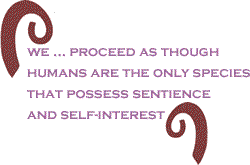What
did you put on your grill this 4th of July? Pork ribs? Beef
burgers? Farm raised chickens? Or, domesticated dogs? No,
not hot dogs, dogs! The ones we walk on leashes, send to
be groomed, purchase clothes to dress up and take to the
vet when sick.

I
never asked myself this question until I digested Melanie
Joys’ thought-provoking book “Why
We Love Dogs, Eat Pigs, and Wear Cows: An Introduction to
Carnism.” For us meat-eaters, Joy, a Boston-based
social psychologist and professor, shakes up our belief
systems, practices ad rituals about why we consume animal
products. The reason we eat cows, pigs, lamb, chickens,
fish, and not dogs, cats, hamsters, and parakeets, according
to Joy, is because our selective belief systems are supported
by emotional and cultural responses that tell us some animals
are edible while others are not.
And
Joy has coined a term for why we treat some animals as our
dear friends, family members and pets and others as our
4th of July barbecue – “carnism.”
Carnism
is an unconscious and accepted practice of eating “certain”
animals. And our selection of edible and inedible animals
is not the presence of disgust, but rather the absence of
it. Joy posits that our absence of disgust is due to psychic
numbing where we mentally and emotionally disassociate ourselves
from the harm, exploitation and violence done to animals
in order to comfortably justify our consumption of them.
For
example, the barbecue ribs some of us delightfully tore
into at our Independence Day family gatherings we know were
the body parts of a cow or pig that lived miserably, suffered
horribly and died unwillingly.
 While
it is true that harming animals run counter to the values
of most people, and many of us know about the maltreatment
of the animals we eat, why do humane people, nontheless,
participate in these inhumane practices? While
it is true that harming animals run counter to the values
of most people, and many of us know about the maltreatment
of the animals we eat, why do humane people, nontheless,
participate in these inhumane practices?
For
one, American agribusinesses hide the slaughtering and maltreatment
of animals. These animals live in horrific and filthy conditions,
cramped into pens and cages in “factory farms,” treated
as living machines. And their death screams we, as consumers
of them, don’t hear.
Joy
also argues that our psychic numbing of the animals we eat
involves us actively engaging in denial, avoidance, objectification
deindividualization and disassociation, conditioning us
to be apathetic to them which is why the typical response
usual is “We’ve always done it.”
Non-violent
activist of India’s
independence, Mahatma Gandhi said, “The greatness of a nation
and its moral progress can be judged by the way in which
its animals are treated.” Whereas in America
we consume every part of the cow, in India
they don’t because cows are sacred. Just as dogs and cats
are found in many American households, so, too were cows
in Indian households part of their families, with loving
names. Hindu religion bans the slaughtering of cows, and
many of India’s
social reform movements advocated non-violence and no cruelty
to animals, which is why their animals - big and small,
from elephants to mice – go unharmed.
To
some, Joy is a zealot for casting meat-eating as genocide
and comparing it to the Holocaust and American slavery.
However, Joy, like Gandhi, sees the maltreatment of animals
integrally linked to other violently dominant and oppressive
belief systems and practices, like sexism and racism that
allow those in power to uncritically sanction abuse.
 “Though
we know that all animals, human and nonhuman, are equally
capable of feeling pain and have lives that matter to them,
we nevertheless proceed as though humans are the only species
that possess sentience and self-interest...We need to see
that all forms of exploitation are enabled by the same mechanisms
and they therefore reinforce one another. The mentality
that puts female humans’ reproductive systems up for legislative
grabs and has shaped a “rape culture” where misogynists
such as Eminem are celebrated is not terribly different
from the mentality that legitimizes confining millions of
female pigs in “rape racks” where they’re forcibly impregnated
throughout the course of their lives simply so their children
can, for instance, provide the topping for a pepperoni pizza,”
Joy stated in an interview. “Though
we know that all animals, human and nonhuman, are equally
capable of feeling pain and have lives that matter to them,
we nevertheless proceed as though humans are the only species
that possess sentience and self-interest...We need to see
that all forms of exploitation are enabled by the same mechanisms
and they therefore reinforce one another. The mentality
that puts female humans’ reproductive systems up for legislative
grabs and has shaped a “rape culture” where misogynists
such as Eminem are celebrated is not terribly different
from the mentality that legitimizes confining millions of
female pigs in “rape racks” where they’re forcibly impregnated
throughout the course of their lives simply so their children
can, for instance, provide the topping for a pepperoni pizza,”
Joy stated in an interview.
Joy’s
book is different from Jonathan Safran Foer’s best- seller
“Eating
Animals.” Foer examines the topics of factory farming
and commercial fisheries as reason why we should stop consuming
animal meat. Joy’s book is written about why people do eat
meat, rather than simply why they shouldn’t. It’s written
for both vegetarians and meat eaters, reaching out to us
meat eaters and inviting us into the conversation rather
than preaching to us. And the book exposes “carnism,” a
system that affects all of us, every day, without our awareness.
People need and deserve to know about “carnism” so that
we can make our food choices freely and wisely.
What did you eat this
4th?
But
before you chomp down on that pig, cow, fish or bird at
your next meal, you might want to check out Joy’s website
at www.carnism.com.
BlackCommentator.com
Editorial Board member, the Rev. Irene Monroe, is a religion
columnist, theologian, and public speaker. She is the Coordinator of the African-American Roundtable
of the Center for Lesbian and Gay Studies in Religion and
Ministry (CLGS) at the Pacific School of Religion.
A
native of Brooklyn, Rev. Monroe is a graduate from Wellesley
College and Union Theological Seminary at Columbia University,
and served as a pastor at an African-American church before
coming to Harvard Divinity School for her doctorate as a
Ford Fellow. She was recently named to MSNBC’s list of 10 Black Women You Should Know.
Reverend Monroe is the author of Let Your Light Shine Like a Rainbow Always: Meditations on Bible
Prayers for Not’So’Everyday Moments. As an
African-American feminist theologian, she speaks for a sector
of society that is frequently invisible. Her website is
irenemonroe.com.
Click here
to contact the Rev. Monroe. |

